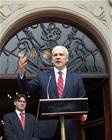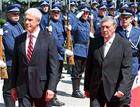Serbian president reaches out to Bosnia
Evelina Topalova, July 8, 2011
 Sarajevo-born Serbian President Boris Tadic, who has been repeatedly blamed for tolerating Bosnian Serbs, visited the capital city of Bosnia for the first time in five years as late as July 7. The visit, which took place amid strong media interest, was aimed at demonstrating friendship towards Bosnia and at healing some old wounds.
Sarajevo-born Serbian President Boris Tadic, who has been repeatedly blamed for tolerating Bosnian Serbs, visited the capital city of Bosnia for the first time in five years as late as July 7. The visit, which took place amid strong media interest, was aimed at demonstrating friendship towards Bosnia and at healing some old wounds.
The visit comes at a time of stretched relations between Belgrade and Sarajevo due to the arrest warrants issued by Serbia against Bosniaks on suspicion of war crimes, committed during the 1992-1995 war. Tadic was explicit that all crimes should be prosecuted and the perpetrators punished regardless of their ethnicity.
Tadic said that he had come up with a proposal to review all indictments in order to see whether they were legally justified. The process of prosecution of war crimes is important not only in the name of reconciliation in the region but also in view of the affirmation of rule of law, Tadic stressed.
His statement has been confirmed by the recent arrest of former Bosnian Serb military commander Ratko Mladic. Mladic's detention, who is being held responsible for the worst massacre since the World War II, was welcomed by the international community but triggered mixed feelings in Republika Srpska (RS) (a constituent part of the trinational federation Bosnia and Herzegovina).
The arrest, labelled by some as treason, spurred rumours that relations between Belgrade and Banja Luka had cooled - a claim that was firmly rejected by the Serbian President. Furthermore, he noted that Serbia was willing to develop parallel ties not only with the RS but also with the Federation of BiH.
Boris Tadic reiterated the well-known position of Belgrade that Serbia respects Bosnia's territorial integrity and sovereignty and will not interfere in the country's internal affairs. He recalled that EU membership necessitates implementation of  reforms and the countries should help each other in the EU integration process.
reforms and the countries should help each other in the EU integration process.
In the past years Tadic has launched series of initiatives aimed at reducing the hostile rhetoric, thus proving to be a pro-European politician with a vision for the future and who is not under the burden of the nationalist past but is working for the reconciliation in the Balkans. In Sarajevo he stated he would take the risk to be accused by nationalists of treason in the name of finding a solution to the common problems and showing a "regional responsibility."
Such a responsibility, but at national level, should be demonstrated by Bosnian politicians as well, because 10 months after the general elections they still cannot agree on power sharing at central level, thus competing with the political crisis in Belgium.
The political impasse will likely deepen if the central parliament fails to approve PM designate Slavo Kukic, a Bosnian Croat, on July 14th - a move that is widely expected. Bosnian Serbs and representatives of the two main Bosnian Croat parties HDZ BiH and HDZ 1990 did not support his nomination at the first round of voting and kept on insisting that the post should be granted to a candidate of the two HDZs.
Disagreements between the three peoples not only hamper the country's efforts to implement major reforms stemming from the EU integration process but also affect negatively the economy. The 2011 state budget failed to receive support at first reading in Parliament while the IMF postponed disbursement of new tranches pending formation of the new central government.
 Bakir Izetbegovic, Andrej Plenkovic | © Council of the EU
Bakir Izetbegovic, Andrej Plenkovic | © Council of the EU Aleksandar Vucic, Recep Tayyip Erdogan | © Serbian Presidency
Aleksandar Vucic, Recep Tayyip Erdogan | © Serbian Presidency Jean-Claude Juncker, Zoran Zaev | © European Commission
Jean-Claude Juncker, Zoran Zaev | © European Commission